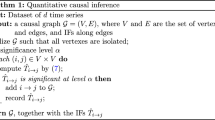Abstract
Causal reasoning involves many interacting concepts that make them difficult to deal with, and for which analytical techniques are inadequate. A cognitive map can be employed, as a tool for qualitative reasoning, to cope with this type of knowledge. Cognitive maps have been used for decision analysis, administrative sciences, management sciences, distributed AI and distributed group decision support. In this paper, we present a formal model for cognitive maps with a precise semantics based on relation algebra. In this way, we justify the classical intuitive inference mechanisms, based on reasoning from causes to effects.
Preview
Unable to display preview. Download preview PDF.
Similar content being viewed by others
References
Axelrod, A. editor: Structure of Decision: The Cognitive Maps of Political Elites. Princeton University Press (1976)
Buede, D. M. and Ferrell, D. Convergence in problem solving: A prelude to quantitative analysis. IEEE Trans. Syst., Man, Cybern. 23 (1993) 746–765
Chaib-draa, B. Causal Reasoning in Multiagent Systems. MAAMAW'97-Agents and Multiagent Systems. M. Boman (ed.), LNAI, Springer-Verlag (1997)
Eden, C. J. and Sims, D. Thinking in organizations. Macmillan, London (1979)
Kelly, G. A. The Psychology of Personal Constructs. New:Norton (1955)
Kosko, B. Neural Networks and Fuzzy Systems. Prentice Hall (1992)
Ladkin, L. B. and Maddux, R. D. On binary constraint problems. Jour. of ACM. 41(3) (1994) 435–469
Levi, A. and Tetlock, P. E. A cognitive analysis of Japan's 1941 decision for war. Journ. of Conflict Resolution. 24 (1980) 195–211
Nakumara, K., Iwai, S. and Sawaragi. T. Decision support using causation knowledge base. IEEE Trans. Syst., Man, Cybern. 12 (1982) 765–777.
Park, K. S. and uKim, S. H. Fuzzy cognitive maps considering time relationships. Int. J. Human-Computer Studies. 42 (1995) 157–168
Ross, L. L. and Hall, R. I. Influence diagrams and organizational power. Admin. Sci. Q. 25 (1980) 57–71
Schmidt, G. and Ströhlein, T. Relations and Graphs. Monog. on Theor. Comput. Science, Springer-Verlag, Berlin (1993)
Smithin, T. and Sims, D. Ubi Caritas?—Modeling beliefs about charities. Eur. J. Opl Res. 10 (1982) 273–243
Wellman, M. P. Inference in cognitive maps. Math. and Comp. in Simul. 36 (1994) 1–12
Zhang, W. R., Chen, S. S. and King, R. S. A cognitive map based approach to the coordination of distributed cooperative agents. IEEE Trans. Syst., Man, Cybern. 22(1) (1992) 103–114
Author information
Authors and Affiliations
Editor information
Rights and permissions
Copyright information
© 1998 Springer-Verlag Berlin Heidelberg
About this paper
Cite this paper
Chaib-draa, B. (1998). A relational modeling of cognitive maps. In: Mercer, R.E., Neufeld, E. (eds) Advances in Artificial Intelligence. Canadian AI 1998. Lecture Notes in Computer Science, vol 1418. Springer, Berlin, Heidelberg. https://doi.org/10.1007/3-540-64575-6_61
Download citation
DOI: https://doi.org/10.1007/3-540-64575-6_61
Published:
Publisher Name: Springer, Berlin, Heidelberg
Print ISBN: 978-3-540-64575-7
Online ISBN: 978-3-540-69349-9
eBook Packages: Springer Book Archive




